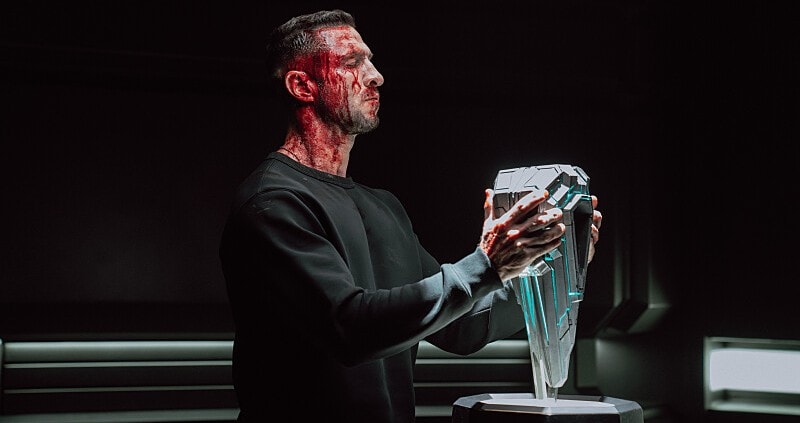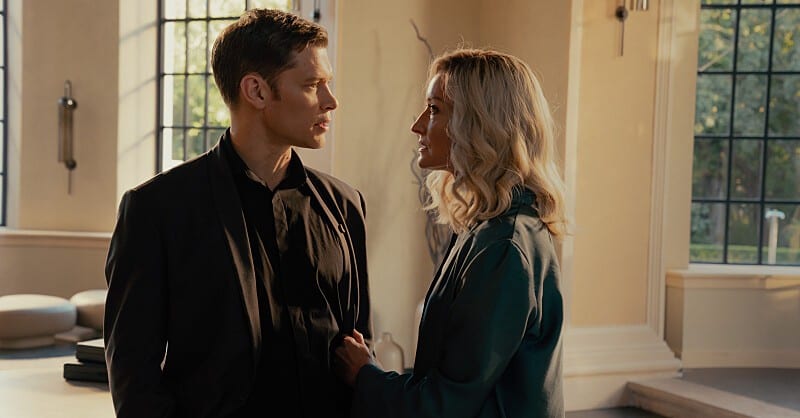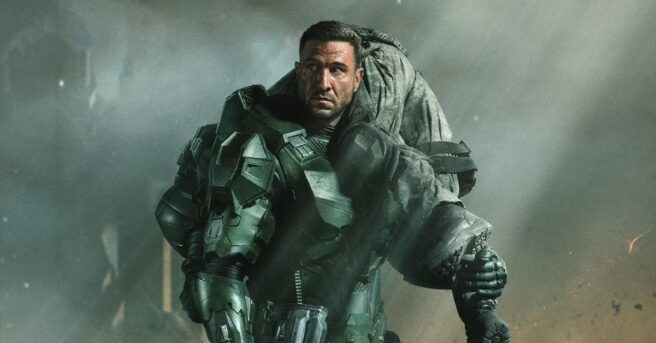
PLOT: In season two, Master Chief John-117 leads his team of elite Spartans against the alien threat known as the Covenant. In the wake of a shocking event on a desolate planet, John cannot shake the feeling that his war is about to change and risks everything to prove what no one else will believe – that the Covenant are preparing to attack humanity’s greatest stronghold. With the galaxy on the brink, John embarks on a journey to find the key to humankind’s salvation, or its extinction — the Halo.
REVIEW: Halo debuted in 2022 with fifteen years of development baggage heaped on top of it. With sky-high expectations for the series, anything less than a seismic shift in video game adaptations was bound to fail. Halo debuted with a muted response that found the Game of Thrones-esque intrigue and conspiracies distracting from what made the game one of the biggest franchises in history. Now, two years and one showrunner later, Halo‘s second season aims to partially reset those expectations and they succeed. With more action and a tone closer to that of the games, Halo is finally the series we have been waiting for. Led by Pablo Schrieber who wears Master Chief’s helmet as often this time around as he doesn’t, this second season of Halo is a substantial improvement over the first and will likely silence any critics of what came before by delivering a more balanced blend of action sequences along with character development that reminded me as much of the Halo video games as it did top-tier genre television series.

The first season of Halo ended with a series of reveals and showdowns that led to the disappearance of Dr. Halsey (Natascha McElhonne), the escape of Makee (Charlie Murphy) after saving John (Schreiber) and unveiling of a star map that leads to Halo, and John left in a coma-like state that allowed Cortana to take control of him. This season opens with minimal explanation of those events and thrusts Silver Team onto a mission where they are rescuing refugees before it can be destroyed by Covenant. It is there that John encounters the alien enemy in a foggy battle that sets up a mystery this season that will challenge his personal ideals as well as the bonds between ONI, UNSC, and the Spartans themselves. The first episodes begin with a ton of action but also lead to a significant amount of character development for John and the other members of his squad. It is a strong opening to the season that connects to events from the prior episodes but forges a strong and distinct tone for the run that follows.
The biggest problem that I had with the first season of Halo was that it felt more focused on creating factions and warring parties, like Game of Thrones, that it failed to capture what fans loved about the Halo games. This season has more action, but it still distinguishes itself from the video game format by making this a character-based series. This run of Halo reminded me more of the acclaimed and fan-favorite series The Expanse with a balanced perspective from the full ensemble of characters. This season, much more time is given to Silver team members Kai (Kate Kennedy), Riz (Natasha Culzac), and Vannak (Bentley Kalu), all of whom get helmet-less arcs that balance that of Master Chief himself. The series also gives us more time with Soren (Bokeem Woodbine) and his wife Laera (Fionna O’Shaughnessy). We also keep Kwan Ha (Yerin Ha) as part of the story to strengthen the ongoing storylines begun last season. My first instinct last season was that this series would be a live-action take on the web series Red Vs. Blue, but to make a dramatic show worth investing in, the characters need to be worth caring about.
While elements of the first season are eschewed in favor of a more focused narrative this time around, there are new additions to the cast. Cristina Rodlo joins the ensemble as Talia Perez, a Marine corporal who appears early in the season premiere and plays a vital role in the ongoing arc which parallels that of Master Chief. Joseph Morgan plays James Ackerson, the successor to Dr. Halsey in running the Spartan program. Morgan could easily be mistaken for a villain the moment he comes on screen, but the true nature of how he fits into the overarching story has a bit more nuance than that. In the four episodes made available for this review, there is a noticeable focal point for the story, something that was very lacking in the kitchen sink approach of season one. This has pros and cons as the series definitely feels more like Halo but not because of the action. The world-building necessitated in the first season is greatly reduced, so the sophomore run gets to build on the heavy lifting that already took place.
New showrunner David Weiner, who previously developed the Peacock series Brave New World, brought on an entirely new writing staff this season including Ahmadu Garba, Marisha Mukerjee, Tom Hemmings, Basil Lee Kreimendahl, and Sarah McCarron. Otto Bathurst, who helmed episodes in season one, is the only returning helmer. Bathurst directed two episodes along with Debs Paterson, Craig Zisk, and Dennie Gordon who each helm a pair of chapters. The dynamic between all of these folks behind the scenes, coupled with video game advisor and producer Kiki Wolfkill overseeing the mythology of Halo, this season is streamlined and stronger for it. There are still weak spots, namely the CGI used on the Spartans themselves when engaged in action sequences, but the Covenant creatures and space landscapes look much better than before. The weakness of the computer effects in the Spartan-centric scenes takes a back seat to the bigger concern in the flatness of the overall feel of the show. The first season was somewhat boring and at times this season gets close to backsliding into that chasm, but it just barely stays out of it. Hopefully, this is a takeaway for the writers to avoid in the likely season three.

Everything about the second season of Halo is a substantial improvement over season one. Led by Pablo Schreiber’s deeper performance, improved special effects, stronger antagonists, and a more involved plot, you will not worry once about how often Master Chief is not wearing his signature helmet. With the shackles of development hell finally behind them, the creative talent behind Halo can once and for all deliver the series we have been waiting for. Halo is not quite at the level of The Last of Us but this season is a massive step in the right direction. I found the first season of this series to be average, at best, and it never redeemed itself for me. I came into this season with apprehension but found myself enjoying it a lot more than I thought I would. There are still places where the series can be improved, especially in the CGI employed, but this season is a step in the right direction for delivering the series Halo fans have been waiting for.
The second season of Halo premieres on February 8th on Paramount+.
The post Halo Season 2 TV Review appeared first on JoBlo.

Leave a Reply